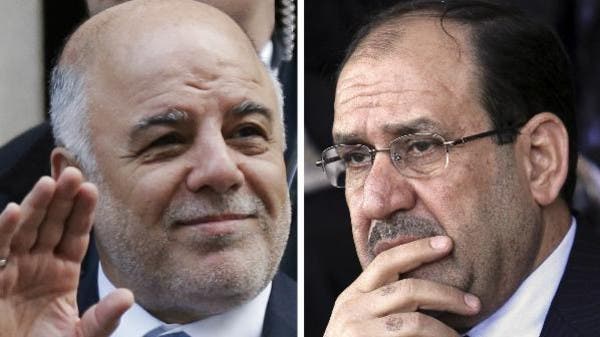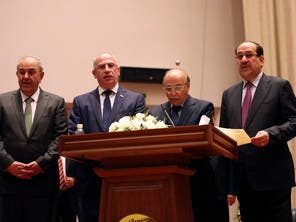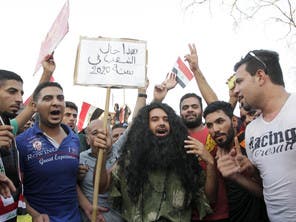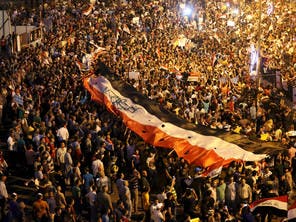BLACKEAGLE
SENIOR MEMBER
What’s next for Iraq and its top dogs after Abadi’s sweeping reforms?

Among the facets of Haider al-Abadi’s (L) seven-point plan is the “immediate” elimination of the three vice presidents - one of them former PM Nouri al-Maliki (R)
By Paul Crompton | and Dina al-Shibeeb, Al Arabiya News
Sunday, 9 August 2015
Saturday’s bold reforms proposed by the Iraqi prime minister - prompted by weeks of protests over Baghdad’s failure to provide basic services - could lead to a change in the country’s entire political structure, a former high-level official and analysts told Al Arabiya News.
Among the outlines of Haider al-Abadi’s seven-point plan is the “immediate” elimination of the three vice president and deputy prime minister’s posts and the sacking of many high-level political cadres that make up Baghdad’s top-heavy government.
The highest-level figure who could position could be dissolved is current Vice President and former two-term Prime Minister Nouri al-Maliki who begrudgingly stepped aside a year ago to make way for Abadi.

In the firing line: Vice Presidents Nouri al-Maliki, right, Osama al-Nujaifi, left of center, Ayad Allawi, left, attend a swearing-in ceremony in Baghdad last year (AP)
Maliki is the most prominent Iraqi political figure in the wake of the 2003 U.S.-led invasion that toppled dictator Saddam Hussein. He was forced out by his own Islamic Dawa party in August last year after accusations of stirring sectarian sentiment, which observers say helped lead to the takeover of vast swathes of the country by the Islamic State of Iraq and Syria (ISIS).
Other prominent figures who could find themselves without a job include Vice President Ayad Allawi, a rival bloc leader and Maliki’s former nemesis, and Vice President and Osama al-Nujaifi, former parliament speaker.
“Maliki and the others cannot do anything in the presence of such great support from the protestors and Sistani,” said Ali Al-Dabbagh, a former Iraqi government spokesman and official who is now one of Maliki’s most outspoken critics.
Vanity posts
Dabbagh said the posts of vice president and vice premier were “unnecessary” and were established to “just to satisfy some of the political blocs” which feature prominently in Baghdad’s checkered political landscape.
While Nujaifi and Maliki voiced support for their own looming dismissals, they may risk facing corruption charges if Abadi continues pressing reforms.
Yet the prime minister’s vaunted move - which came after consultation with the influential spiritual leader of Iraq’s Shiite majority, Grand Ayatollah Ali al-Sistani- would require the constitution to be amended, meaning that sudden action is unlikely.

People shout slogans during a demonstration against corruption and poor services in regard to power cuts and water shortages, in Basra province, Iraq, August 7, 2015. (Reuters)
Additionally, some experts believed that Abadi’s bid to abolish the top posts is constitutionally dubious and could be delayed by judicial wrangling.
“[Abadi] cannot unilaterally eliminate posts, especially that of vice presidents, as he pleases,” said Ali Khedery, chief of Dubai-based consultants Dragoman Partners and the longest continuously serving American official in Iraq in the years following the 2003 U.S.-led invasion.
Mass corruption
Iraq, which languishes near the bottom of the U.S.-based Transparency International's corruption perception rankings, has long found its political class facing the anger of citizens, who claim that the post-Saddam government has failed to deliver on its promises.
Popular anger boiled over after consistent power outages and the failure of government services during the recent summer heat wave – in addition to Baghdad’s inability to gain back ground seized by ISIS.
“The people are fed up,” said Dabbagh. “They are no longer giving them [the government] their support as they have been bluffed for more than 12 years.”
But Abadi’s moves to weed out long-standing corruption could prove a tough task. “Most of the politicians and political parties in the country are corrupt to one extent or another,” said Khedery. “If they probe one person, then all must be tried.”

Demonstraters show support for Iraqi Prime Minister Haider al-Abadi in central Baghdad, August, 9, 2015. (Reuters)
Saturday’s unexpected reform announcement surprised Iraqis, and has so far been popular on the streets, said Dabbagh.
Abadi who “has previously been restricted,” from full-fledged reforms due to lack of support, now has a “strong card” to make tough decisions, according to Kirkuk-based analyst Abdulrahman al-Sheikh Talib.
“Abadi must draw a clear road map for the Iraqi people over how to probe names of officials in spite of their position and power whether Maliki, Allawi or Nujaifi or others.”
However, regardless of Baghdad’s next steps – including parliamentary approval – Saturday’s events could have a big impact in the government’s future.
Dabbagh, who described the ongoing protests as an “uprising,” strengthened by Abadi’s measure would “change the whole political structure.”
What lie in store for big figures like Maliki, whose administration was recently accused of squandering $1 trillion?
“Maliki is not a person who will run away,” Dabbagh said. “Maliki is going to stand in and face all the steps relating to him being fired.”
Last Update: Monday, 10 August 2015 KSA 23:45 - GMT 20:45
http://english.alarabiya.net/en/perspective/analysis/2015/08/09/What-s-next-for-Iraq-and-its-top-dogs-after-Abadi-s-sweeping-reforms-.html

Among the facets of Haider al-Abadi’s (L) seven-point plan is the “immediate” elimination of the three vice presidents - one of them former PM Nouri al-Maliki (R)
By Paul Crompton | and Dina al-Shibeeb, Al Arabiya News
Sunday, 9 August 2015
Saturday’s bold reforms proposed by the Iraqi prime minister - prompted by weeks of protests over Baghdad’s failure to provide basic services - could lead to a change in the country’s entire political structure, a former high-level official and analysts told Al Arabiya News.
Among the outlines of Haider al-Abadi’s seven-point plan is the “immediate” elimination of the three vice president and deputy prime minister’s posts and the sacking of many high-level political cadres that make up Baghdad’s top-heavy government.
The highest-level figure who could position could be dissolved is current Vice President and former two-term Prime Minister Nouri al-Maliki who begrudgingly stepped aside a year ago to make way for Abadi.

In the firing line: Vice Presidents Nouri al-Maliki, right, Osama al-Nujaifi, left of center, Ayad Allawi, left, attend a swearing-in ceremony in Baghdad last year (AP)
Maliki is the most prominent Iraqi political figure in the wake of the 2003 U.S.-led invasion that toppled dictator Saddam Hussein. He was forced out by his own Islamic Dawa party in August last year after accusations of stirring sectarian sentiment, which observers say helped lead to the takeover of vast swathes of the country by the Islamic State of Iraq and Syria (ISIS).
Other prominent figures who could find themselves without a job include Vice President Ayad Allawi, a rival bloc leader and Maliki’s former nemesis, and Vice President and Osama al-Nujaifi, former parliament speaker.
“Maliki and the others cannot do anything in the presence of such great support from the protestors and Sistani,” said Ali Al-Dabbagh, a former Iraqi government spokesman and official who is now one of Maliki’s most outspoken critics.
Vanity posts
Dabbagh said the posts of vice president and vice premier were “unnecessary” and were established to “just to satisfy some of the political blocs” which feature prominently in Baghdad’s checkered political landscape.
While Nujaifi and Maliki voiced support for their own looming dismissals, they may risk facing corruption charges if Abadi continues pressing reforms.
Yet the prime minister’s vaunted move - which came after consultation with the influential spiritual leader of Iraq’s Shiite majority, Grand Ayatollah Ali al-Sistani- would require the constitution to be amended, meaning that sudden action is unlikely.

People shout slogans during a demonstration against corruption and poor services in regard to power cuts and water shortages, in Basra province, Iraq, August 7, 2015. (Reuters)
Additionally, some experts believed that Abadi’s bid to abolish the top posts is constitutionally dubious and could be delayed by judicial wrangling.
“[Abadi] cannot unilaterally eliminate posts, especially that of vice presidents, as he pleases,” said Ali Khedery, chief of Dubai-based consultants Dragoman Partners and the longest continuously serving American official in Iraq in the years following the 2003 U.S.-led invasion.
Mass corruption
Iraq, which languishes near the bottom of the U.S.-based Transparency International's corruption perception rankings, has long found its political class facing the anger of citizens, who claim that the post-Saddam government has failed to deliver on its promises.
Popular anger boiled over after consistent power outages and the failure of government services during the recent summer heat wave – in addition to Baghdad’s inability to gain back ground seized by ISIS.
“The people are fed up,” said Dabbagh. “They are no longer giving them [the government] their support as they have been bluffed for more than 12 years.”
But Abadi’s moves to weed out long-standing corruption could prove a tough task. “Most of the politicians and political parties in the country are corrupt to one extent or another,” said Khedery. “If they probe one person, then all must be tried.”

Demonstraters show support for Iraqi Prime Minister Haider al-Abadi in central Baghdad, August, 9, 2015. (Reuters)
Saturday’s unexpected reform announcement surprised Iraqis, and has so far been popular on the streets, said Dabbagh.
Abadi who “has previously been restricted,” from full-fledged reforms due to lack of support, now has a “strong card” to make tough decisions, according to Kirkuk-based analyst Abdulrahman al-Sheikh Talib.
“Abadi must draw a clear road map for the Iraqi people over how to probe names of officials in spite of their position and power whether Maliki, Allawi or Nujaifi or others.”
However, regardless of Baghdad’s next steps – including parliamentary approval – Saturday’s events could have a big impact in the government’s future.
Dabbagh, who described the ongoing protests as an “uprising,” strengthened by Abadi’s measure would “change the whole political structure.”
What lie in store for big figures like Maliki, whose administration was recently accused of squandering $1 trillion?
“Maliki is not a person who will run away,” Dabbagh said. “Maliki is going to stand in and face all the steps relating to him being fired.”
Last Update: Monday, 10 August 2015 KSA 23:45 - GMT 20:45
http://english.alarabiya.net/en/perspective/analysis/2015/08/09/What-s-next-for-Iraq-and-its-top-dogs-after-Abadi-s-sweeping-reforms-.html
